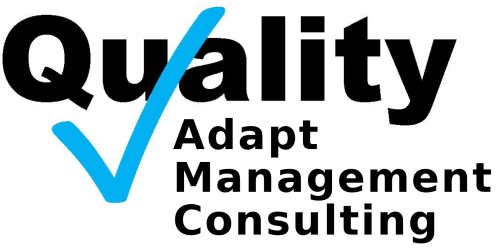An ISO 9001 internal audit in your Davenport IA company by Adapt Management Consulting is a systematic and independent examination of your organization's Quality Management System (QMS) to determine its compliance with ISO 9001 requirements and the effectiveness of its implementation. Contact us for more information or call: 262-271-7283.
During our time together, these are the steps we go through during an ISO 9001 internal audit:
-
Audit Planning:
- Define the audit scope, objectives, and criteria, including the specific ISO 9001 clauses and processes to be audited.
- Select qualified internal auditors and assign responsibilities.
- Develop an audit plan that outlines the audit schedule, methodology, and resources required.
-
Preparation:
- Review relevant documentation, including the ISO 9001 standard, the organization's QMS documentation (e.g., quality manual, procedures, work instructions), and previous audit reports.
- Familiarize auditors with the organization's QMS, processes, and quality objectives.
-
Opening Meeting:
- Conduct an opening meeting with auditors and representatives from the audited area to explain the purpose and scope of the audit, the audit process, and expected outcomes.
- Establish communication channels for the audit.
-
Document Review:
- Examine QMS documentation to assess its compliance with ISO 9001 requirements. This includes evaluating the organization's policies, procedures, records, and quality objectives.
-
Process Auditing:
- Assess the implementation and effectiveness of QMS processes, including process interactions, inputs, outputs, and performance indicators.
- Verify that processes are being followed as documented and that they achieve the intended results.
-
Interviews and Observations:
- Interview personnel involved in QMS processes to gather information, clarify procedures, and verify adherence to quality requirements.
- Observe processes in action to assess their effectiveness and identify areas for improvement.
-
Evidence Collection:
- Collect objective evidence to support audit findings. This may include documents, records, interview notes, and observation reports.
-
Finding Identification:
- Identify and document audit findings, including any non-conformities (instances where requirements are not met) and areas for improvement. Findings should be specific, clear, and traceable to ISO 9001 clauses or processes.
-
Reporting:
- Prepare an audit report that summarizes the audit process, findings, observations, and conclusions.
- Provide recommendations for corrective actions or improvements and prioritize them based on their significance.
-
Closing Meeting:
- Conduct a closing meeting with auditors and representatives from the audited area to discuss the audit findings, observations, and recommendations.
- Address any questions or concerns raised by the audited area.
-
Corrective Actions:
- Work with the audited area to develop corrective action plans for addressing non-conformities or areas for improvement identified during the audit.
- Ensure that corrective actions are comprehensive, specific, and include timelines for implementation.
-
Follow-Up:
- Conduct follow-up audits or reviews to verify the implementation and effectiveness of corrective actions.
-
Audit Closure:
- Formally close the audit and communicate the final audit report to relevant parties.
-
Continuous Improvement:
- Use the audit findings and recommendations as opportunities for continual improvement in the QMS and QMS processes.
ISO 9001 internal audits are essential for ensuring that the QMS is effective, compliant, and continuously improving. Regular audits help organizations identify areas for enhancement, maintain compliance with ISO 9001 standards, and achieve their quality objectives.
Davenport, Iowa, stands out as a city ripe with opportunities for businesses. Its strategic location, diverse economy, supportive environment, and vibrant community life create a compelling proposition for entrepreneurs and companies. As Davenport continues to grow and innovate, it invites businesses to become part of its story of success and community-driven prosperity. Whether starting up, expanding, or relocating, Davenport offers a welcoming and fertile ground for your business ambitions.
Davenport, Iowa, part of the Quad Cities metropolitan area, presents a compelling landscape for entrepreneurs and businesses with its strategic location, robust economic framework, and vibrant community. As a city that combines small-town charm with big-city amenities, Davenport offers a unique blend of resources and opportunities conducive to business growth and development.
Strategic Location and Connectivity
Davenport's prime location on the banks of the Mississippi River is not just scenic but strategic. It provides businesses with vital connectivity and access to major markets. The city's well-developed infrastructure, including interstates, railways, and the nearby Quad City International Airport, ensures efficient transportation and logistics, vital for manufacturing, distribution, and commerce.
Diverse Economic Base
Davenport boasts a diverse and resilient economy. Key industries include manufacturing, healthcare, retail, and services, with an emerging emphasis on technology and innovation. This economic diversity creates a stable business environment and offers multiple avenues for business ventures and expansions. Prominent companies find a home here, benefiting from the supportive economic climate and skilled workforce.
Business-Friendly Environment
The city is known for its business-friendly environment. Davenport and its economic development partners offer various incentives and resources to support businesses, including tax increment financing, enterprise zones, and development programs. These initiatives, coupled with a competitive cost of living and doing business, make Davenport an attractive place for enterprises of all sizes.
Skilled and Educated Workforce
Davenport's commitment to education and workforce development is evident in its educational institutions and training programs. With several colleges and universities, including St. Ambrose University and Palmer College of Chiropractic, the city produces a steady stream of skilled graduates. Ongoing training programs align with industry needs, ensuring a workforce ready to meet the challenges of a dynamic business landscape.
Quality of Life
A compelling aspect of doing business in Davenport is the quality of life it offers. The city is known for its vibrant arts scene, recreational opportunities, and diverse cultural events, contributing to a high quality of life for residents and an attractive environment for attracting and retaining talent. Businesses benefit from a community where employees can enjoy a balanced and fulfilling lifestyle.
Community and Support Networks
Davenport's sense of community is strong, with active organizations such as the Quad Cities Chamber of Commerce providing support, networking, and advocacy for businesses. This collaborative atmosphere fosters connections, partnerships, and a shared vision for growth and prosperity among the business community.


